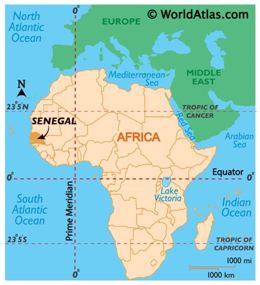Political Crisis in Senegal
19-02-2024
03:29 PM
1 min read

What’s in Today’s Article?
- Background
- Reasons Behind the Current Political Crisis in Senegal
- What Has Been Senegal’s Recent Democratic Record?

Background
- Senegal, officially the Republic of Senegal, is a country in West Africa, on the Atlantic Ocean coastline.
- Senegal is bordered by Mauritania to the north, Mali to the east, Guinea to the southeast and Guinea-Bissau to the southwest.
- On February 3rd, Senegal’s President Maky Sall postponed Presidential elections due on February 25.
- Protests have emerged across the country, with the police cracking down on protestors through indiscriminate detentions and violence leading to the death of one of them.
- The unprecedented decision in Dakar (capital of Senegal) has been decried as a Constitutional coup d’état by the government’s critics.
Reasons Behind the Current Political Crisis in Senegal
- The current unrest is a repeat of the bloody violence witnessed on the streets of Dakar last year when more than 20 lives were lost and hundreds were injured.
- The reason behind the violence was a two-year prison sentences lapped on the leading opposition candidate Ousmane Sonko.
- He is a populist who targeted the country’s elites for corruption and resisted the influence of the former colonial power France.
- He was convicted in a trial for immoral behavior against a woman.
- In the protests that erupted in 2021, security forces reportedly shot dead 12 persons.
- In January this year, the Constitutional Council barred Mr. Sonko from the Presidential race.
- President Sall took office in 2012 riding a wave of popular resistance against his predecessor seeking a third term.
- Yet he asserted last March that he was legally permitted to run for a third term.
- The decision to delay polls has sparked speculation over Mr. Sall’s machinations to consolidate his position between now and the elections.
What Has Been Senegal’s Recent Democratic Record?
- Sall’s retrograde decision to deferelections marks a change from the country’s periodic and smooth transfer of power witnessed for decades under a multi-party democratic system.
- Unlike all of its neighbours, Senegal has never undergone a military coup or a civil war since it gained independence from France in 1960.
- This is a country viewed as a beacon of democracy in a region increasingly under the grip of military takeovers.
- Moreover, President Sall has been instrumental in pushing military dictators in the Economic Community of West African States (ECOWAS) to facilitate a timely transfer of power to elected governments.
- In early 2017, Senegalese troops successfully led a regional mission to force out long-time leader Yahya Jammeh in the Gambia, when he refused to step down after losing elections.
- Dakar has evidently abandoned this important regional role at a juncture when a number of west African states have recently descended into military dictatorships.
- The situation in Senegal raises doubts, as in Guinea, where President Alpha Condé’s controversial re-election for a third term in 2020 ended up in a coup the following year.
- Burkina Faso, Mali and Niger are already under military rule.
- The return of military dictatorships in African countries has been a recurrent theme in the 2020s and a serious regression after the heroic liberation struggles they waged in the 1960s.
- The big powers must reconsider their traditional role in the region as a whole.
Q1) What do you mean by the Horn of Africa?
The Horn of Africa, also known as the Somali Peninsula, is a large peninsula and geopolitical region in East Africa. Located on the easternmost part of the African mainland, it is the sixth largest peninsula in the world.
Q2) What minerals is Africa famous for?
The continent has 40 percent of the world's gold and up to 90 percent of its chromium and platinum. The largest reserves of cobalt, diamonds, platinum and uranium in the world are in Africa. It holds 65 percent of the world's arable land and ten percent of the planet's internal renewable fresh water source.
Source: Political Crisis in Senegal


